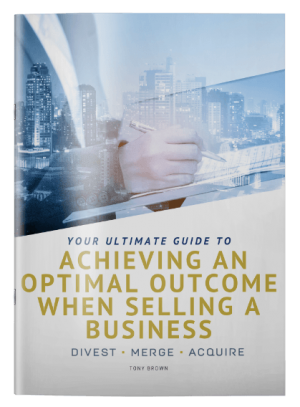Only 20% of all of the businesses listed for sale ever sell*
90% of all of the people who begin the search to buy a business never complete a transaction*
These US small business sales benchmarks* would apply equally to the Australian small business market, and to a slightly lesser extent, to larger businesses.
The reasons for these atrocious statistics are many, but include the industry’s over-reliance on passive web-based marketing and the under-utilisation of targeted B2B marketing.
It is for these reasons that we have invested heavily over more than 21 years and over $5M in our M&A database, so we can actively target strategic buyers for each business. This allows us to achieve for our clients the best possible success rates, well above industry averages and substantially better than 80% of all clients taken to market.
In fact we won’t take on the responsibility of selling a client’s business unless we can identify and target substantial numbers of strategic buyers for that business (how to do that is explained below).
What could possibly go wrong in M&A?
Imagine if every single action you ever undertook in M&A resulted in immediate and positive outcomes.
Without the right tools, M&A can be a massively wasteful process for everyone involved. Even at its most efficient, with the right tools and a successful outcome, the M&A process may be only 10% efficient and 90% waste. At its worst, 100% of all activities could be wasted if there is no resultant deal done.
Imagine if every business for sale was investigated by only one buyer. The perfect match! No wasted effort, no dry gullies, no unproductive marketing. Just ‘tap and go’ with ‘The Buyer’.
Yet even with the perfect process, the product you are selling (the business itself) is imperfect and things can be wrong or go wrong, leading to a potentially wasteful process with an unhappy ending.
No matter how good the M&A Advisor and processes are, if the client’s business performance goes down, everyone goes down with the ship!
Putting business performance aside, the list of potential waste generators in an M&A process is practically limitless. Here are some examples of the pitfalls and how to avoid them:
Buyers may:
- Investigate hundreds of businesses without buying any of them.
- Target businesses priced beyond their financial capacity.
- Not take the time to find out their financial capacity before starting to investigate businesses.
- Not know what they are looking for or how to find it.
Solutions for Buyers:
- Decide on their target market profile and confirm their financial capacity BEFORE starting to look for a business. If you don’t have your own agenda, you’ll end up being carried along by those that do.
- Instead of wasting time sifting through opportunities randomly, engage in a systematic search of ALL businesses matching the target profile, rather than limiting only to those that are currently on the market. More than half of all business owners will sell if approached by or on behalf of genuine purchasers. This is because most businesses where the owners are willing to sell are not actually on the market and owners are attracted by the thought that a genuine buyer will allow them to short-circuit the potentially wasteful open M&A process.
Owners may:
- Engage M&A advisors who have no processes, knowledge or marketing capability.
- Try the DIY approach and end up in a mess.
- Not take the time to prepare properly, and therefore not optimise their financial outcome.
- Engage the wrong accountants or lawyers, disrupting or sabotaging the sale.
- Not obtain quality tax advice and end up paying more tax than necessary.
- Not be fully committed to the sale and pull out at the last minute.
- Not be properly briefed on how extensive the process will be, including due diligence.
- Not have adequate records, financial integrity or formalise commercial arrangements.
- Set too high a price and miss out on selling to those who could afford it, if it were priced realistically.
Solutions for Owners:
- Research and engage the right advisors, performing their own due diligence on who to engage to assist them.
- Ask a trusted advisor.
- Perform a google search of the prospective advisory firm’s [NAME] + [ACCC] (for Aus only). Some high profile business brokerages will show up as being renowned marketeers through that very simple check.
- Apply criteria such as these: https://divestmergeacquire.com/partner/#member-firm.
M&A Advisors may:
- Try and take short cuts and fail to market the business adequately. This article compares the various ways to market businesses: https://divestmergeacquire.com/sale-process/how-to-market-and-sell-strategic-businesses/
- Not properly qualify or advise clients, to ensure their expectations are realistic.
- Not check whether the owner has received proper tax advice and know the after tax outcome for a given price.
- Not prepare a comprehensive Information Memorandum so buyers can properly assess the opportunity.
- Invest/waste copious amounts of time manually researching possible targets.
- Target the wrong markets or not target any markets at all!
- Source and interact with a large number of responses and expressions of interest from buyers before finding one or more willing to proceed.
- Not properly qualify buyers for financial capacity and/or suitability to operate the business.
- Invest copious time and money and not sell the business.
Solutions for M&A Advisors:
- Be on top of your game. Be part of a professional organisation or network with proven systems, processes, documentation, training, resources etc., such as our own M&A advisory network: https://divestmergeacquire.com/partner/#member-firm
- Properly market opportunities to identify and target the right buyers.
Everyone may invest time and money on the process, to find:
- There is some legislative, legal or commercial reason why the business is unsaleable.
- The business performance has taken a dive and is now not attractive to either buy or sell.
- One or more key employees or customers leaves at the 11th hour, or potentially worse for the buyer if it happens just after the transaction.
The list of what can go wrong in M&A is endless.
Having the right M&A team, advice, processes and resources are essential to optimising outcomes….and beating those odds!
*References:
1. “Industry Statistics Every Buyer Should Know”, by Richard Parker, published in BizBuySell in alliance with Wall Street Journal
2. “The Business Reference Guide”, by Tom West
3. “How to Plan and Sell a Business”, Jim Stauder

